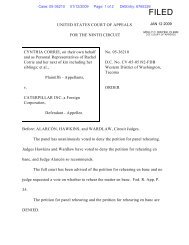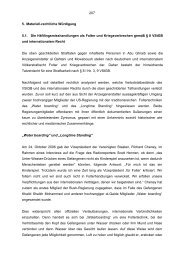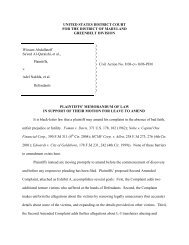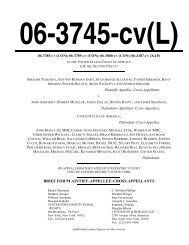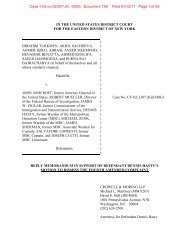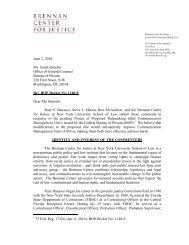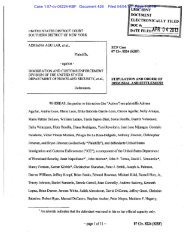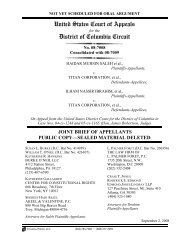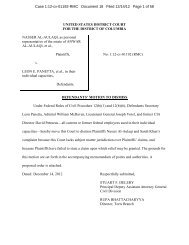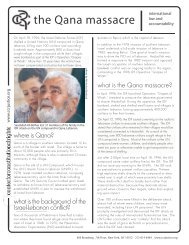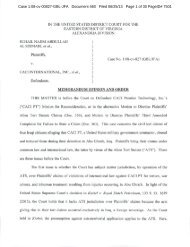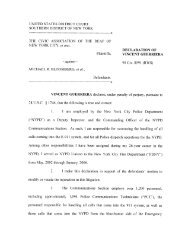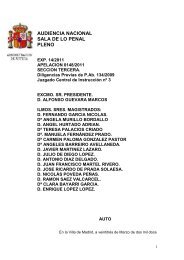11 Years and Counting - Center for Constitutional Rights
11 Years and Counting - Center for Constitutional Rights
11 Years and Counting - Center for Constitutional Rights
You also want an ePaper? Increase the reach of your titles
YUMPU automatically turns print PDFs into web optimized ePapers that Google loves.
Mohammed al-Adahi<br />
Mohammed al-Adahi, born in 1962, is a Yemeni, whose case is emblematic of the way in which the D.C.<br />
Circuit Court has gutted habeas corpus of all meaning. Married with two children, al-Adahi had never left<br />
Yemen until July 2001, when he took a vacation from the oil company where he had worked <strong>for</strong> 21 years to<br />
accompany his sister to her wedding in Afghanistan. Afterwards, as he traveled through Pakistan to take a<br />
plane home, he was seized on a bus <strong>and</strong> sent to Guantánamo.<br />
In August 2009, Judge Gladys Kessler granted al-Adahi’s habeas corpus petition, ruling that the government<br />
had not established that, as alleged, he “was part of the inner circle of the enemy organization al-Qaeda,”<br />
even though there was “no question that the record fully supports the Government’s allegation that Petitioner<br />
had close familial ties to prominent members of the jihad community in Afghanistan,” <strong>and</strong> that his<br />
brother-in-law was, apparently, “a prominent man in K<strong>and</strong>ahar,” <strong>and</strong> even though it was “undisputed” that<br />
Osama bin Laden “hosted <strong>and</strong> attended [the] wedding reception in K<strong>and</strong>ahar,” <strong>and</strong> that al-Adahi “was<br />
briefly introduced to bin Laden.”<br />
Drawing on al-Adahi’s own statements, who she saw testify live from Guantánamo, Judge Kessler accepted<br />
that there was no reason to doubt his explanation about why he traveled to Afghanistan, <strong>and</strong> noted that he<br />
had freely admitted to briefly meeting Osama bin Laden. She also refused to accept his brief attendance at<br />
the al-Farouq training camp as evidence of anything sinister, acknowledging that he “pursued training at<br />
al-Farouq to satisfy ‘curiosity’ about jihad, <strong>and</strong> because he found himself in Afghanistan with idle time,” <strong>and</strong><br />
noting in particular that the camp leaders expelled him after seven to ten days “<strong>for</strong> failing to comply with<br />
the rules,” which included a ban on smoking.<br />
Other ludicrous allegations—that al-Adahi was an instructor at al-Farouq in February 2000 (18 months be<strong>for</strong>e<br />
his arrival in Afghanistan) <strong>and</strong> that he was a bodyguard <strong>for</strong> bin Laden—were dismissed because Judge<br />
Kessler identified that both claims had been made by a prisoner <strong>for</strong> whom “the record contains evidence<br />
that [he] suffered from ‘serious psychological issues,’” <strong>and</strong> another prisoner who “suffers from serious credibility<br />
problems that undermine the reliability of his statements.”<br />
Instead of releasing him, however, the government appealed <strong>and</strong>, in July 2010, Judge R<strong>and</strong>olph reversed<br />
Judge Kessler’s, ruling, which Judge R<strong>and</strong>olph described as “manifestly incorrect—indeed startling.” Judge<br />
R<strong>and</strong>olph claimed that Judge Kessler had considered each piece of evidence on its own merits, instead of as<br />
part of a whole, <strong>and</strong> described this as a “fundamental mistake that infected the court’s entire analysis.” Judge<br />
Kessler had, in fact, examined the evidence as part of what the government contended was a “mosaic” of<br />
intelligence, to be viewed as a whole, rather than being examined in isolation, but had found the “mosaic”<br />
to be unpersuasive. In a startling departure from precedent, Judge R<strong>and</strong>olph gave no credence to Judge Kessler’s<br />
opportunity to see al-Adahi testify live <strong>and</strong> subject to the government’s cross examination.<br />
Responding to the ruling, in which Judge R<strong>and</strong>olph also indicated that he believed the “preponderance”<br />
st<strong>and</strong>ard used in the habeas cases to be too high, one of Mohammed al-Adahi’s attorneys, John A. Ch<strong>and</strong>ler,<br />
“criticized the appeals court <strong>for</strong> reassessing the evidence being used to hold al-Adahi instead of assessing<br />
the trial court’s ruling <strong>for</strong> errors of law,” as was noted in an article at the time. Ch<strong>and</strong>ler explained, “The ap-



